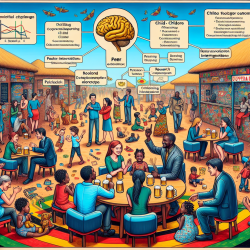Improving Practitioner Skills Through Decentralized Training: Insights from the I-DecT Project

The Integrated Decentralized Training (i-DecT) project at the University of KwaZulu-Natal (UKZN) in South Africa provides a groundbreaking approach to health professions education, particularly in resource-poor rural and peri-urban settings. As a practitioner focused on data-driven decisions, understanding the outcomes of this research can significantly enhance your practice and lead to better outcomes for the children you serve.The i-DecT project addresses a critical need: ensuring that health professionals are adequately prepared for the realities of work in underserved areas. This is particularly relevant for practitioners in fields such as speech-language pathology, where effective service delivery often hinges on understanding and adapting to the specific needs of diverse communities.
Key Findings and Recommendations
The i-DecT project identifies several factors that influence the successful implementation of decentralized clinical training (DCT):
- Pedagogical Challenges: Effective teaching methods are crucial. The project recommends using transformative learning approaches that promote critical reflection and rational discourse among students. This helps develop professional reasoning and practice, essential for working in resource-constrained environments.
- Infrastructural Challenges: Adequate infrastructure, including space, equipment, and resources, is necessary for effective service delivery. Ensuring that training sites are well-equipped can significantly enhance the learning experience.
- Staffing Challenges: The availability of qualified supervisors and clinicians is critical. The project highlights the importance of interprofessional practice and collaboration among different health disciplines to improve service delivery.
Implementing the Findings
As a practitioner, you can implement the findings of the i-DecT project in several ways:
- Adopt Transformative Learning Approaches: Encourage critical reflection and rational discourse in your training programs. This can help develop the skills necessary for working in diverse and challenging environments.
- Focus on Infrastructure: Advocate for better resources and facilities in your training sites. This can enhance the quality of education and service delivery.
- Promote Interprofessional Collaboration: Foster a culture of collaboration among different health disciplines. This can lead to more holistic and effective care for patients.
Encouraging Further Research
The i-DecT project underscores the importance of ongoing research to understand and address the challenges of decentralized training. Practitioners are encouraged to engage in research and contribute to the growing body of knowledge in this area. By doing so, you can help develop more effective training models and improve health outcomes for underserved communities.To read the original research paper, please follow this link:
Integrated Decentralized Training for Health Professions Education at the University of KwaZulu-Natal, South Africa: Protocol for the I-DecT Project.
Citation: Govender, P., Chetty, V., Naidoo, D., & Pefile, N. (2018). Integrated Decentralized Training for Health Professions Education at the University of KwaZulu-Natal, South Africa: Protocol for the I-DecT Project. JMIR Research Protocols, 7(1), e19. https://doi.org/10.2196/resprot.7551










